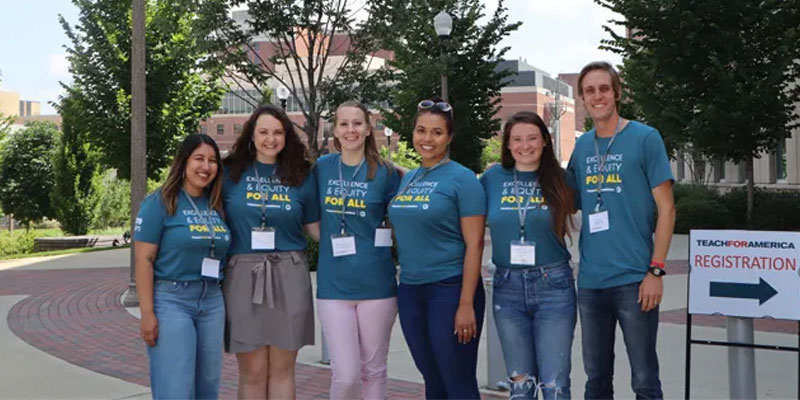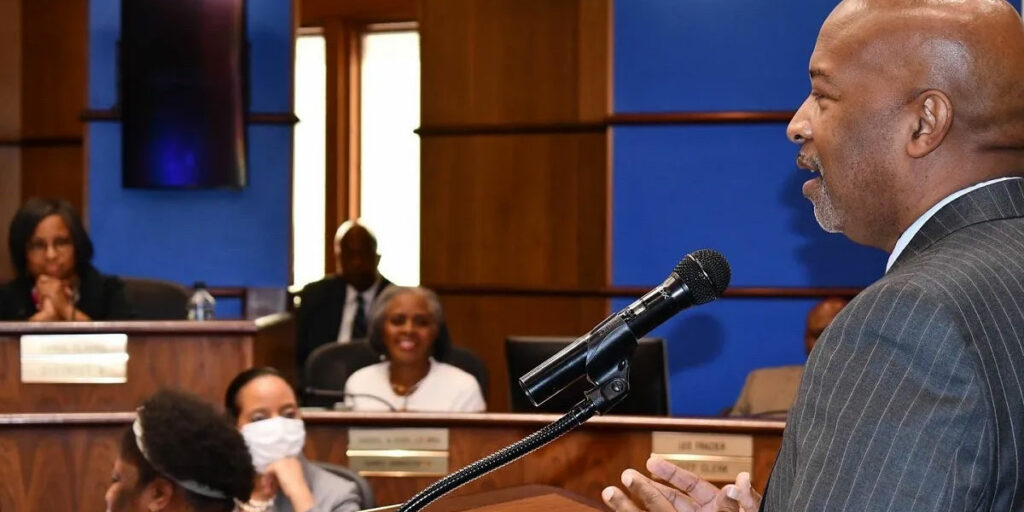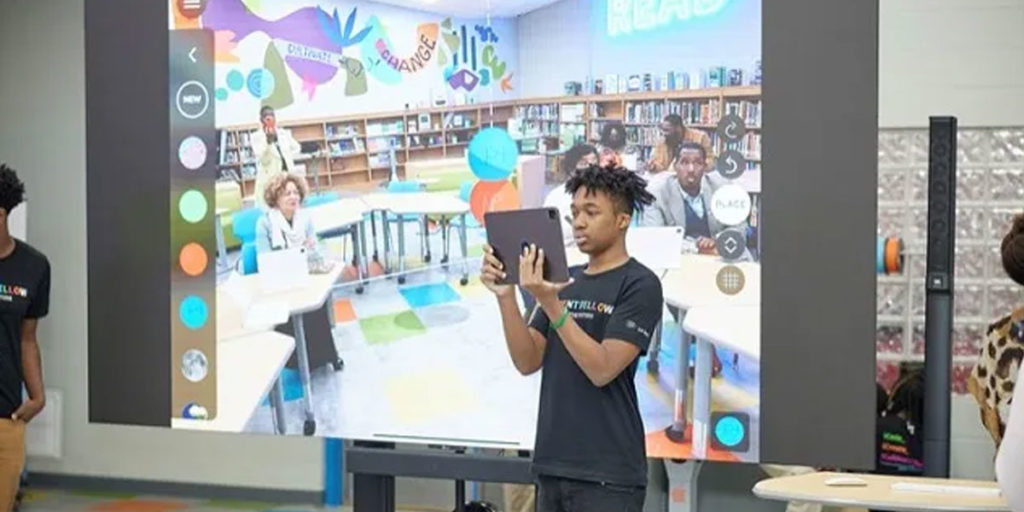Five numbers, the ZIP code where you were born, provide the strongest predictor of future success, including educational attainment and economic outcomes. Damon Bailey, executive director of Teach For America – Alabama (TFA-AL), hopes to change that.
“We want a high-quality education to be the norm for all students,” Bailey said. “So that each child can become economically mobile, happy and live the lives they’ve dreamed of for themselves.”
In a state with a poverty level of 16.8%, 12% of people under 65 years of age without health insurance, and about 25% of households without broadband internet access, creating change and opportunity in some of the highest-needs schools can seem impossible.
According to Teach For America (TFA), in the U.S., only one in two students living in poverty will graduate from high school, and those who do will leave high school at an eighth grade skill level and only 8% will graduate from college by the age of 24.
“We know right now that the problem in America is that all children do not have the privilege of getting an excellent education,” Bailey said. “We’re not preparing all of our children to be learners in a 21st century world.”
10th anniversary
In 2010, community members from the Black Belt believed that the TFA program could increase the educational opportunity for students in their districts and invited the organization into the state.
According to Bailey, that’s the first step.
“If the community thinks we can be a partner that adds value to what they’re trying to accomplish with the children, we’ll engage in the conversation to understand the challenges and partner to serve students and schools with the greatest need,” Bailey said.
Need is defined loosely by the percent of students who are economically disadvantaged, receiving free and reduced lunch, and student performance scores.
“We’ve observed correlation between high poverty systems and student achievement,” Bailey said. “If you have an economically disinvested community usually not too far along the line, you’ll see disinvestment in the education system as well.”
Teach For America, an AmeriCorps designated nonprofit, believes that teaching is an act of leadership. Therefore, the program identifies graduates from a diverse list of universities around the country that have a strong commitment to learning, an appreciation for the potential of all children, and a desire to create meaningful change in the education system, to strengthen the movement for educational equity and excellence.
“We think that the very best teachers exhibit behaviors and make decisions that are consistent with any high performing leader in any other context,” Bailey said. “They have to build trust with different groups of people, use data to inform the decisions they make, set bold goals in partnership with others, and invest and organize others in working toward accomplishing those.”
Corps members are asked to make a lifelong commitment to expanding opportunity, beginning with two years of teaching in some of the highest-need schools. According to TFA, during this time, members will gain firsthand experience of the assets and challenges in their communities, as well as the institutional barriers that limit access to opportunity – developing the skills and a mindset to effect change as a lifelong “systems-change leader.” Informed and inspired by their students, many corps members continue teaching, while others pursue leadership roles in schools and school systems or launch careers in fields that shape educational access and opportunity.
“The key distinction with TFA, is that while you’re learning the leadership philosophy, multi-adaptive and technical skills teachers need, you’re assigned a coach that is making sure you’re codifying all of that learning and putting it into practice over the two years,” Bailey said.
Since 2010, over 500 active and alumni members have contributed to meaningful work in Alabama, reaching over 80,000 students. There are over 150 teachers currently working in Alabama classrooms today.
“As we go into our 10th year, it is impressive that we have current corps members who were previously taught by Alabama corps members when they were students,” Bailey said. “They’re all brilliant and very talented and deeply committed towards devoting the next two years to creating the same opportunities and delivering the same kind of educational experience that has so deeply shaped their own lives.”
Leading Alabama
Bailey is an example of the mission in action.
“I stumbled across Teach For America at Hampton University,” Bailey said. “I never had an interest in teaching.” Bailey had been on track to be a cardiac surgeon, his lifelong dream, when he sat in on an informational session for TFA his senior year.
“The recruiter used terms and language that gave voice to experiences I had as a child,” Bailey said. “There were distinct differences between the education I received and the experiences I was having, compared to cousins, teammates and friends from church, but we only lived 5-10 minutes away.”
According to Bailey, that informational session gave him the language to understand the policies and practices that structured the inequality he witnessed and experienced.
“She was talking about the population of people who don’t get the access to quality education – people who look just like me,” Bailey continued.
Since Hampton University is a private, historically black university, the session attendees were all black college students.
“A significant minority of people in our community make it to that level,” Bailey said. “We have to be the people on the front line creating a different reality for people that right now, just because of where they were born, will never get the opportunity to sit in the seat we’re sitting in.”
Determined to make a difference, Bailey joined the Metro Atlanta TFA corps in 2009. He advanced within the organization, teaching for three years, serving as a corps coach to new teachers for two years, and then managing the middle school and high school student achievement strategy for two years.
In August 2019, Bailey was named executive director for Alabama’s TFA program.
In the years since his teaching experience, Bailey had been in touch with former students who are now part of the TFA program.
“It’s surreal. … You’re making an impact and planting a seed for that child and creating a base of people who are committed to justice and equity for their life,” Bailey said.
A future for the state
“While there has been a lot of progress in education in Alabama, there are still measurable differences in outcomes drawn along very clear lines,” Bailey said. “Those who have opportunity and access to credible education, and those who don’t.”
“We have to make sure equity is at the center of how we evaluate progress,” Bailey continued. “It has to be the driver for all the decisions we make and how we evaluate success. We should adequately resource and support people in communities based on the challenges specific to each community”
For the 2020-2021 session, TFA-AL has active partnerships with the Birmingham City Schools, Jefferson County Public Schools, Perry County Public Schools, Hale County, and Selma City Schools, supported by grants, state and federal funding, as well as corporate nonprofit contributions.
The Alabama Power Foundation has provided grant support for Teach For America since the program’s inception.
“By immersing themselves in the communities in which they serve, Teach for America teachers are solving the problems of inequities in education that exist even beyond the classroom,” said Myla Calhoun, president of the Alabama Power Foundation. “It is inspiring to witness this transformative work and the measurable outcomes they have created by providing access to quality education for students in Alabama.”
Bailey said much progress has been made in the past 10 years.
“In the previous school year, one in five students in Birmingham City Schools were taught by TFA-AL teachers. On average, our secondary students increased their ACT scores by 2.39 points, and our elementary students saw gains of 1.2 years of reading growth in a single year,” he said.
Over the next decade, Bailey hopes to see twice as many kids achieve key educational milestones, while developing a path toward economic mobility. “Twice may not be as much as we can accomplish. … That’s just the baseline.”
To help accomplish this goal, Bailey has devised a local strategy to augment the national program, which includes actively recruiting high-quality leaders from historically black colleges and universities that do not receive national support, developing an effective digital coaching and mentoring program for teachers during the COVID pandemic, reaching out to veteran teachers who have roots in Alabama and encouraging them to return, and partnering deeply to align strategies with those of the district and school sites where TFA-AL works.
“We want to bring as many people as possible into this work,” Bailey said. “To build a diverse coalition of people who believe education inequality is solvable and they’re willing to bring their own friends in, mobilize around policy, and hold our state, our system and everyone in the work of education accountable for delivering an education our students deserve.”
(Courtesy of Alabama NewsCenter)













